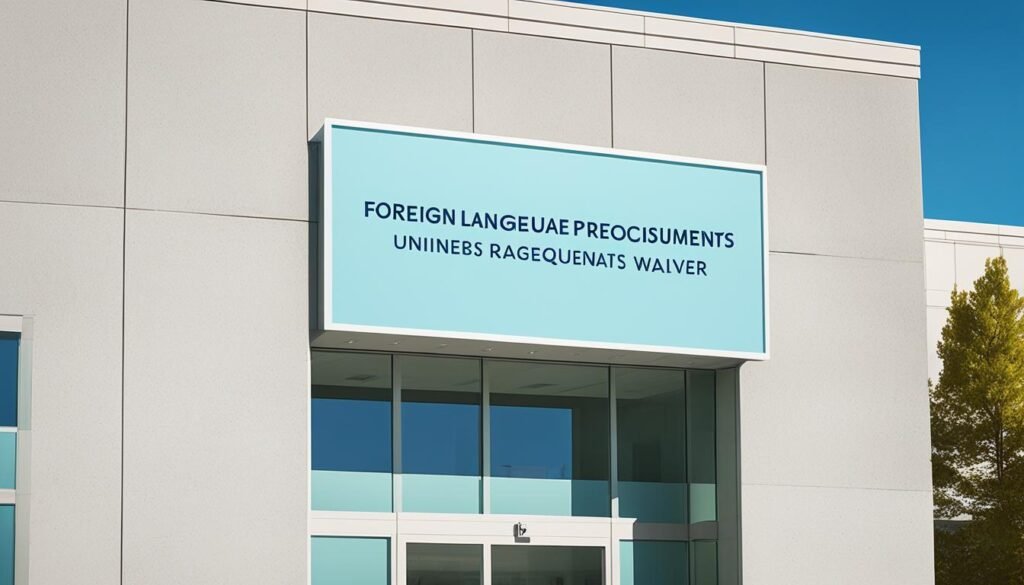The Continents States University is dedicated to providing accessible and inclusive education to students across the globe. As part of this commitment, the university recognizes the diverse linguistic backgrounds of its applicants and offers flexible options for fulfilling foreign language proficiency requirements. This article explores the various pathways through which students can obtain a waiver for the foreign language requirement, enabling them to seamlessly integrate into the university’s diverse academic community.
Key Takeaways
- The Continents States University offers waivers for foreign language proficiency requirements, ensuring inclusive access to higher education.
- Waivers can be obtained through demonstrating proficiency in the student’s primary language or providing evidence of comprehensive language education.
- International students may also be eligible for foreign language requirement waivers, further diversifying the university’s global student population.
- The university’s flexible policies prioritize student success by accommodating a wide range of linguistic backgrounds and educational experiences.
- Prospective students can explore the various waiver options to determine the best path for fulfilling the foreign language proficiency requirement.
Understanding College Foreign Language Requirements
Navigating the complex landscape of college foreign language requirements can be a daunting task for prospective students. However, understanding the different types of these requirements and the common languages studied can help you plan your academic path more effectively.
Types of Foreign Language Requirements
Colleges typically have two main types of foreign language requirements: admission requirements and graduation requirements. Many competitive institutions require applicants to have completed at least 2 years of a foreign language in high school as part of their admission criteria. Additionally, colleges often mandate that students fulfill 1 or more semesters of a foreign language as part of their general education curriculum.
Common Foreign Languages Studied in Colleges
The most popular foreign languages studied by U.S. college students include Spanish, French, American Sign Language, German, and Japanese. These languages are widely offered across various academic institutions, allowing students to choose the one that best aligns with their interests and career aspirations.
By understanding the different types of foreign language requirements and the languages commonly studied, prospective college students can make informed decisions about their academic planning and ensure they meet the necessary criteria for admission and graduation.
Do All Colleges Require a Foreign Language?
When it comes to college admissions, the requirement for foreign language proficiency is a topic of ongoing discussion. Most competitive colleges have a foreign language prerequisite for first-year applicants, typically requiring 2 years of a single foreign language in high school. However, it’s important to note that not all colleges strictly adhere to this rule.
In fact, some colleges strongly recommend but do not require foreign language classes for admission. This means that students can still be accepted without having taken foreign language courses in high school. But the story doesn’t end there. When it comes to college graduation requirements, many universities do require students to complete 1 or more semesters of a foreign language as part of their general education.
The good news is that there can be exceptions to these foreign language requirements. Certain circumstances, such as documented learning disabilities or English being a student’s second language, may qualify for waivers or alternative options. So, while foreign language proficiency is often seen as a valuable asset for college-bound students, it’s not an absolute necessity for every institution.

The key is to research the specific policies of the colleges you’re interested in and understand their stance on foreign language requirements. This will help you plan your high school coursework and ensure you meet the necessary criteria for admission and graduation.
How Many Years of Foreign Language Are Required for College?
Many colleges and universities across the United States have foreign language requirements for admission and graduation. The number of years of foreign language study required can vary significantly between institutions. While some colleges may only expect applicants to have taken 2 years of a single foreign language in high school, others have stricter policies that necessitate 3 or more years of study.
Foreign Language Requirements for Selected Colleges
For example, the University of California system generally requires 2-3 years of the same foreign language for admission, while the University of Michigan mandates 4 years. Meanwhile, the Massachusetts Institute of Technology (MIT) only requires 2 years, but recommends 4 years of foreign language study. It’s important for prospective college students to research the specific foreign language requirements by college they are interested in to ensure they meet the necessary prerequisites.
Beyond admission, many universities also have foreign language requirements for graduation, often ranging from 9 to 12 credits in the same language. This means students may need to continue their years of foreign language required for college even after they enroll. Understanding these nuanced policies can help high school students plan their course schedules accordingly.
Can You Get the Foreign Language Requirement Waived for Admission?
Colleges recognize that the foreign language admission requirement can be a significant challenge for some applicants. Fortunately, in certain cases, students may be able to petition for a waiver of this requirement. Accommodations for a waiver can be available for students with individualized education plans or 504 plans. International students who attended high school in a country where the primary language of instruction was not English may also qualify for a foreign language waiver.
Accommodations for Waiving Language Requirements
If a student faces difficulties in meeting the foreign language requirement due to a learning disability or other extenuating circumstances, they may be able to obtain a waiver. Colleges often provide accommodations for students with individualized education plans (IEPs) or 504 plans. These accommodations can include waiving the foreign language requirement or allowing the student to substitute alternative coursework.
Waiver for International Students
International students who have completed their high school education in a country where the primary language of instruction was not English may also be eligible for a foreign language requirement waiver. Colleges recognize that these students have already demonstrated proficiency in a non-native language, which can be used to fulfill the foreign language admission requirement.
Additionally, some colleges may waive the foreign language requirement for applicants who already hold a bachelor’s degree, as they have already demonstrated their academic capabilities.
Should You Take Foreign Language Classes in High School?
Taking foreign language classes in high school can be incredibly beneficial for students who plan to attend college. Many colleges and universities require students to have at least 2 years of a single foreign language as a condition of admission. By taking foreign language courses in high school, students can fulfill this requirement and expand their academic options when applying to colleges.
The most commonly taught foreign languages in U.S. high schools are Spanish, French, Chinese, Latin, and German. Students should choose a language that interests them, regardless of popularity. Learning a foreign language not only looks impressive on college applications but can also provide students with valuable communication skills and cultural awareness that will serve them well in their academic and professional careers.
While the importance of taking foreign language classes in high school is clear, some students may be hesitant to do so. However, by investing the time and effort now, students can set themselves up for success in college and beyond. The skills and knowledge gained from learning a new language will not only enhance their academic credentials but also open up new opportunities for personal and professional growth.
University of Chicago’s Foreign Language Proficiency Waiver Policy
The University of Chicago has a specific foreign language proficiency waiver policy for graduate applicants. This policy allows students to seek an exemption from the university’s foreign language requirement under certain circumstances. Two key pathways to obtain a waiver are the primary language waiver and the education-based waiver.
Primary Language Waiver
Applicants may qualify for a primary language waiver if English has been their primary language of communication and schooling since childhood. This means that if an applicant has used English as their main language throughout their academic and personal life, they can apply for a waiver of the foreign language proficiency requirement.
Education Waiver
The University of Chicago also offers an education-based waiver for applicants who have been enrolled for at least one full academic year as a full-time, degree-seeking student at an accredited English-medium post-secondary institution in certain approved countries. This waiver recognizes that these applicants have demonstrated their proficiency in English through their academic studies.
It’s important to note that the university does not accept waivers for any other reasons beyond these two specific pathways. Applicants must carefully review the university’s foreign language proficiency waiver policy and ensure they meet the criteria to be eligible for an exemption.

Acceptable Tests for Proving English Proficiency
When it comes to demonstrating English proficiency for college admission, the University of Chicago only accepts two standardized tests: the TOEFL iBT (including at-home versions) and the IELTS Academic exam. No other proficiency tests, coursework, certificates, or endorsements are accepted as proof of English language skills.
The TOEFL iBT and IELTS Academic are the acceptable English proficiency tests recognized by the University of Chicago. Applicants must submit official score reports directly from the testing agency, and the scores are valid for up to 2 years prior to the application deadline.
This strict policy ensures that all international students meet a consistent standard of English language proficiency before being admitted to the university. By relying solely on the TOEFL and IELTS exams, the University of Chicago can accurately assess an applicant’s readiness for the academic demands of their programs.
Foreign Language Proficiency Requirements Waiver at The Continents States University
The Continents States University, an accredited institution in Missouri, offers a waiver for students seeking to bypass the foreign language proficiency requirement for admission. This accommodation recognizes that not all applicants possess the same language background or educational experiences, and provides flexibility for eligible individuals.
Students with individualized education plans (IEPs) or 504 plans may qualify for a waiver, as the university aims to ensure accessible education for all. International students, too, can apply for a waiver if they have already demonstrated English proficiency through standardized testing or prior academic work.
Those who have already earned a bachelor’s degree from an accredited institution may also be eligible for a foreign language requirement waiver at The Continents States University. This policy acknowledges the diverse educational paths students may have taken before seeking further studies.

By offering this waiver, The Continents States University ensures that the foreign language proficiency requirement does not pose undue barriers to qualified applicants. This inclusive approach aligns with the university’s mission to provide accessible, high-quality education to students from all backgrounds.
Waivers for PLC Languages at The Continents States University
The Continents States University recognizes the importance of language proficiency and offers waivers for students who have demonstrated expertise in PLC (Priority Languages and Cultures) languages. This policy aims to accommodate students with diverse linguistic backgrounds and provide them with the flexibility to focus on their academic pursuits without the burden of additional language requirements.
Students can submit various forms of documentation, such as high school transcripts, International Baccalaureate (IB) scores, or Advanced/Ordinary (A/O) level examinations, to prove their language proficiency and request a waiver of the foreign language requirement. This streamlined process allows qualified students to bypass the language course requirements and dedicate their time and energy to their chosen fields of study.
For those who lack the necessary documentation, The Continents States University offers proficiency exams. By successfully completing these assessments, students can demonstrate their language skills and fulfill the foreign language requirement without the need for additional coursework. This approach ensures that all students, regardless of their linguistic backgrounds, have the opportunity to showcase their capabilities and potentially waive the language mandate.
The Continents States University’s PLC language waiver policy reflects its commitment to fostering a diverse and inclusive academic environment. By recognizing and validating the existing language skills of its students, the university empowers them to focus on their academic passions and contribute their unique perspectives to the broader campus community.
Waivers for Other Language Departments
At The Continents States University, the opportunities for students to have foreign language requirements waived extend beyond just the PLC languages. The university provides avenues for students to seek waivers for a range of other language-focused departments, including Classical Studies, East Asian Languages & Civilizations, and various other language programs.
Students interested in exploring foreign language waivers for other departments should consult directly with the specific language program or department they are interested in. The waiver process and requirements may vary across different language disciplines, so direct communication with the relevant department is crucial to understand the steps and criteria for obtaining a language requirement waiver.

By providing these diverse waiver options, The Continents States University demonstrates its commitment to accommodating students with different linguistic backgrounds and experiences. This flexibility allows students to focus their academic pursuits on their areas of interest and expertise, while still fulfilling the university’s broader educational objectives.
Foreign language proficiency requirements waiver
Navigating the complexities of college foreign language requirements can be a challenging task for many students. However, understanding the available options for waiving these requirements can open up new possibilities. The process of obtaining a foreign language proficiency requirement waiver involves carefully examining the specific policies and accommodations offered by individual universities, such as The Continents States University.
By exploring the different types of foreign language requirements and the potential accommodations, students can identify the best path forward. This may include demonstrating proficiency through standardized tests, providing evidence of education in a specific language, or seeking waivers for international students. The key is to proactively engage with the admissions office and understand the institution’s specific waiver policies.
At The Continents States University, for instance, students may be eligible for a primary language waiver or an education waiver, depending on their individual circumstances. These waivers can alleviate the burden of meeting the foreign language proficiency requirement and allow students to focus on their academic pursuits without the additional hurdle of a language prerequisite.
By staying informed and taking advantage of available accommodations, students can navigate the path to college admission or graduation while leveraging the waiver of foreign language proficiency requirements. This can ultimately lead to a more streamlined and personalized academic experience, empowering students to achieve their educational goals.
Conclusion
In summary, the college foreign language requirements can present obstacles for some students, but there are options available to obtain a waiver or accommodation. Universities like the Continents States University offer pathways for students to bypass the foreign language proficiency prerequisite based on their individual circumstances and qualifications.
By understanding the various waiver policies and accommodations, students can find ways to meet their academic goals without being hindered by language prerequisites. This flexibility allows students to focus on their primary areas of study and pursue their desired degree programs without the added burden of meeting foreign language requirements.
Overall, the foreign language proficiency requirements waiver provides an opportunity for students to tailor their educational journey to their specific needs and abilities, ultimately enabling them to succeed in their academic pursuits.
Source Links
- English Language Proficiency – UChicagoGRAD | The University of Chicago – https://grad.uchicago.edu/admissions/apply/english-language-requirements/
- What Is a College Foreign Language Requirement? | BestColleges – https://www.bestcolleges.com/blog/college-foreign-language-requirement/
- Language Waivers | Penn Language Center – https://plc.sas.upenn.edu/students/language-waivers


